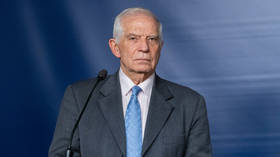Indian farmers take to coal smuggling as way of life
Coal is a vital natural resource which meets two thirds of India's energy needs. With such high consumption, illegal mining is now commonplace, which creates problems both for local residents and the environment.
In Jharia in the eastern state of Jharkhand, coal is so plentiful that illegal mining is rampant. Thousands of locals dig coal from its open cast mines. Coal smuggler Mohammad Sameem Ansari earns around $4 a day from the practice – much more than what he makes from farming.
“We get the coal from here and then take it away in our vehicles. It is risky work but we manage to dig out five to twelve tons of coal every month,” Mohammad Sameem Ansari said.
Coal companies lose around $120 million every year because of smuggling. Dhruva Mandal transports his illegally-mined fuel to villages in the area on his bicycle. With almost 200 kilos of coal, it is backbreaking work.
“We have to travel 40 kilometres to get this coal. We sell to marriage parties, hotel owners, and anybody who needs coal for cooking,” Dhruva Mandal told.
Yet the very industry that drives Jharia could well bring about its collapse. Local residents showed RT how blasting in the area has created cracks in their homes. And barely 100 meters away, underground fires are raging in the coalfields – threatening to engulf inhabited areas.
“The gas and dust is unhealthy. You are probably feeling it already, if you stay another two hours you will get an idea of how polluted the environment is here,” shared with RT local resident Rabindranath Chakravarty. “And there is no drinking water here, in spite of every house having a well. We have to bring drinking water from four kilometers away.”
“According to regulations, once you are finished with an open-cast mine, you have to fill it up, first with rocks and debris and then yellow soil. Then plant trees on top. These are the rules, but nobody here is following them,” Told activist Mahindra Singh.
Bharat Coking Coal Limited says open cast mines are more productive than underground mines, as they can use heavy machinery to excavate the coal.
“The entire Indian economy is dependent on us generating power, and you are asking us to leave our large deposits of coal where they are?” questioned Subir Ghosh, Assistant General Manager at Bharat Coking Coal Limited. “And the best quality coal is at the top, near the surface. Whoever tries to stop us is committing a crime.”
India’s appetite for energy is constantly growing and as long as imported crude oil remains expensive and local coal remains cheap, open cast mines will remain a common site in central India.












